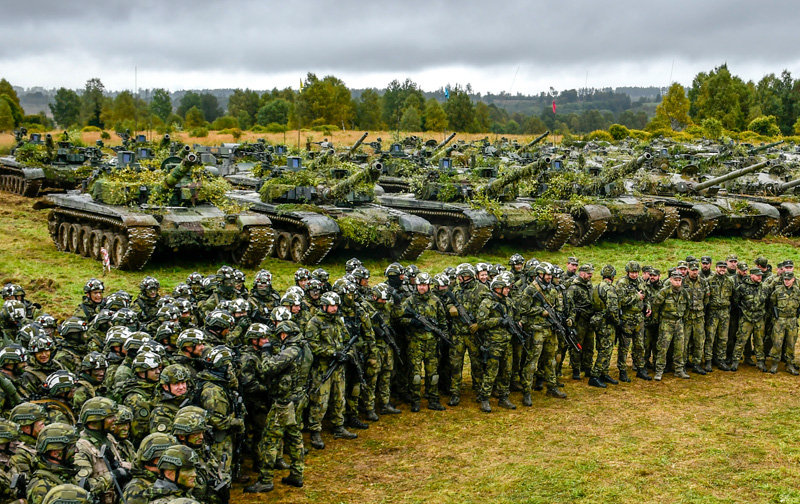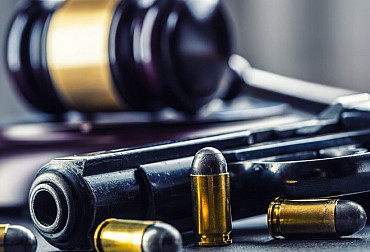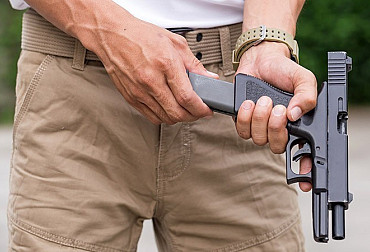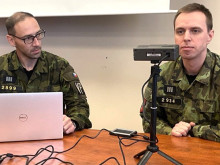Gen. Karel Řehka: We need strong armed forces, we need a resilient society
Yesterday, the 11th annual conference entitled Our Security is Not a Given, organized by the Jagello 2000 association, took place in the Spanish Hall of Prague Castle. It is a regular meeting of top domestic political representatives, leading security experts and foreign guests. They evaluate not only the current security situation, but also discuss the way forward in ensuring the defence and security of the Czech Republic. This year's conference was part of the celebration of the 25th anniversary of the Czech Republic's accession to NATO, which is why this year's conference featured speakers such as Lord George Robertson, who served as NATO Secretary General from 1999 to 2003 (Lord Robertson was also present at the first edition of this conference in 2014), and the 42nd President of the United States of America, Bill Clinton. Javier Solana, former Secretary General of NATO (1995-1999), also sent his video greeting. The conference was also addressed by the President of the Czech Republic Petr Pavel, Prime Minister Petr Fiala, Minister of Defence Jana Černochová, Minister of Foreign Affairs Jan Lipavský, Chief of the General Staff of the Czech Armed Forces Lt. Gen. Karel Rehka, etc. This important event was attended by many other guests from the ranks of ambassadors, military attaches, former Chiefs of the General Staff of the Czech Armed Forces and the professional public.

The 25th anniversary of the Czech Republic's accession to the North Atlantic Treaty Organization, the war in Ukraine, the current security situation and threats - these were the main topics of this year's exceptionally busy conference. In his introduction, the former Chief of the General Staff of the Czech Armed Forces, Army General Jiří Šedivý, reminded that the Czech Army's journey to NATO began 30 years ago with participation in the Partnership for Peace programme initiated by then US President Bill Clinton. According to Šedivý, the Army gained the possibility of close cooperation with its NATO partners, which it took advantage of even before joining the Alliance. In 1996, it joined the first IFOR mission in the Balkans, and the experience from this operation, including cooperation with the British division in charge, was subsequently a significant contribution to the construction of our army and the development of our security system. General Šedivý further stated that in 2005 the army became a fully professional corps, on which not only our allies but also the citizens of the Czech Republic can rely. It was the first former Warsaw Pact state to have a representative, the current President of the Czech Republic, Petr Pavel, as Chairman of the NATO Military Committee.

At the conference, Czech Prime Minister Petr Fiala said that the conflict in Ukraine concerns us as well and that it is impossible to be impartial. According to Fiala, being passive would mean not only throwing our friends and allies overboard, but also waiting for Russia to come to us and want our country too. "We are on the right side. Ukraine has not provoked anything, it is only defending itself fairly. The Russian regime, on the other hand, is killing civilians and liquidating its political opponents unnecessarily every day," the Prime Minister said in his speech, announcing that in addition to the bindingly confirmed purchase of 300 000 pieces of artillery ammunition for Ukraine from third countries, the Czech ammunition collection initiative has been non-bindingly pledged another 200 000 pieces. 18 countries have already joined the initiative.

In her speech, Defence Minister Jana Černochová then reminded the audience that for a quarter of a century we have been part of the strongest and most reliable defence family of democratic states in history, whose purpose or future after the end of the Cold War everyone doubted. Černochová also recalled that support for our entry into NATO in 1999 was then at the level of only a slight majority of the Czech population. Yes, at that time many naively thought that with the end of the bipolar world we would no longer face the threats of 20th century wars. Since the end of the 1990s, the security situation in the world has only got worse and worse, and the current events are, unfortunately, a painful sobering for all.

Russia's war of aggression against Ukraine has been a daily reality in Europe for more than two years. Ukraine has had the courage to go its own way, it has not shied away from intimidation, it has not given in to Russian interference in its politics and to Putin's efforts to rebuild the Russian empire. And it is paying a heavy price for it. She is fighting not only for her survival, but also for the principles on which our society and our security are based," the Minister said. "We wish for peace in Ukraine and at least in the whole of Europe. But Russian tanks bring a very different reality. What Russia is offering is not peace, but surrender, slavery and oppression. Torture and murder of the civilian population. We must never force Ukraine into such a peace. We know from our own history what occupation by a hostile power is like," said Ms. Cernochová, adding that she considers it our moral duty to prevent others from having to go through this experience. Therefore, according to the Defence Minister, it is necessary to provide Ukraine with all possible support so that it can stand in its just struggle and defend its and our freedom, sovereignty and territory.
The 10th Secretary General of NATO, George Robertson, said in his speech that the fight in Ukraine is also being fought for us, and the North Atlantic Treaty Organization must send a clear message to the Kremlin that it will give the invaded country every possible means to defend itself and drive out the invader.

The accession of the Czech Republic, Poland and Hungary to NATO in 1999, he said, marked a new chapter after the end of the Soviet confrontation and the Cold War. "But perhaps we celebrated too soon, because this chapter full of hope was too short and ended on February 22 two years ago, when Russian tanks crossed the border of a sovereign state," Robertson recalled the beginning of the invasion of Ukraine, adding that there was an awful lot at stake in Ukraine. "If the Russians prevail in Ukraine, they will not stop there," the former NATO Secretary General stressed, adding that the Russians are unlikely to be so rash as to go into confrontation with NATO states, but will multiply their efforts in Moldova or Armenia. Whoever is in the White House, however, Lord Robertson said Europe must not rely on him to be more concerned about its security than he is. "Building our defence, resilience and investing in our future are in our own interests," Robertson stressed.

In the following discussion session entitled "75 years of NATO: how to achieve a successful century of the Alliance?" Tomáš Pojar, Adviser to the Prime Minister on National Security, recalled the importance of defence funding. In his speech, he recalled that before the Velvet Revolution, during the Cold War, socialist Czechoslovakia spent over 5% of its GDP on defence. "We have to take collective defence seriously now and we have to know that even what Donald Trump says, that US troops will not go to help those who do not think independently, for their own security and for their own defence. That's what common sense dictates. If we all spend enough on defense, if we all think about our own security, if we all set an example for ourselves, I don't think we have to worry about Article 5 being triggered," Pojar noted in his speech. He also recalled that 25 years ago, before the Czech Republic joined, NATO had exactly half of its members.

The Chief of the General Staff of the Czech Armed Forces, Lieutenant General Karel Rehka, said in his speech that the success of the Alliance lies in the fact that we can prevent war against the member states. This means avoiding war as we have been trying to do. "We must do everything we can. And eventually, of course, if we do not prevent war, we must win it with the least possible negative consequences for us. The Alliance has the capability to do that," General Rehka said. NATO today has 32 member states and that is its strength. "As an Alliance, we protect a billion people. We have some 3.5 million soldiers in arms, not counting the reserves. The GDP of the countries of the Alliance is 20 times larger than Russia's. And the ratios in combat aviation to Russia are 3 to 1, in ships 4 to 1, in submarines 3 to 1. There is parity in ground forces, except maybe in artillery.

The defence budgets of all member states combined are three and a half times higher than Russia and China combined. Importantly, NATO is a nuclear alliance, so it has a nuclear deterrent," said Gen. Řehka, who also pointed out that the Czech Republic had already committed to spending 2% of GDP on defence at the Wales Summit in 2014 and also in Vilnius in 2023, but times have changed considerably in the meantime and today the two percent is rather a necessary minimum. "If we would have kept what all parties here declared in 2014 and there would have been an increase to two percent by today as promised, we would have had 280 billion crowns more in the defence budget," Gen. Rehka. He also added that we need a strong armed forces and a resilient society, which needs a society-wide approach, as the current defence strategy says. According to Rehka, society needs to understand the real threats we now face, needs to be educated and should also ask what our government is doing to eliminate these threats. The Chief of the General Staff also mentioned in his speech that a strong economy and a good defence industry are also very important.

Lieutenant General Miroslav Hlaváč, 1st Deputy Chief of the General Staff of the Czech Armed Forces, also confirmed the fact that budget stability is important for the army: "The stability of the budget is important for us to be able to plan the development of the army in the long term, because we do not plan the development of the army in the horizon of two or three years, as is the standard financial planning at the state level. We plan in a five- to 10-year horizon so that we can continuously develop the army." Maintaining 2% of GDP for defence is then crucial, he said. "It was mentioned here by Tomas Poyar, but also by Chief of General Staff Karel Rehka, that the two percent is important for the continuous renewal of equipment and material that we need for development," Hlaváč stressed. He said the development of the Czech Armed Forces' capabilities will not stop with the acquisition of new aircraft, guns or BMPs. "The development must be continuous, because if it is not continuous, the requirement subsequently spills over and the state does not have the means to ensure the development of the army. There will be a mix of systems that are already chargeable to the times. For example, you have a type of aircraft that is already designed for the 21st century, and it is then very problematic for the two systems to somehow interconnect and work together. We want to build the capability of the military as one functional unit. That means that all the systems - from aircraft, helicopters to guns, tanks and BVP - should work as one functional system. From this point of view, it is very important for us to maintain the two per cent of GDP expenditure so that everything is continuous and long-term," concluded Lieutenant General Miroslav Hlaváč.
The need for continuity in defence spending was also confirmed for CZ DEFENCE by Lubomír Metnar, Chairman of the Defence Committee of the Czech Parliament. Because otherwise, let's say, modern armies could not be built at the present time and the capabilities that are needed to ensure the defence capability not only of the Czech Republic but also of Europe could not be ensured."
A growing problem in Czech society is the fight against disinformation and hybrid threats in general, which was of course also voiced at yesterday's conference. According to Tomáš Pojar, we should focus on the Ministry of Education and in the long term we should work on all possible levels of education in the field of critical thinking, from the young to the elderly. "The mechanisms are there and we need to concentrate our attention there," emphasized Tomáš Pojar. In addition to the need for education, General Rehka also mentioned the problem in communication. "I think we have big reserves in this," the Chief of General Staff suggested.
The highlight of the conference was the speeches of the President of the Czech Republic Petr Pavel and former US President Bill Clinton. In his speech, President Pavel recalled that joining NATO was not a given three decades ago and had opponents in the Czech Republic and abroad. He said that the Czech Republic has proved itself as a member of the Alliance, where we can be good and reliable allies, especially in military missions. "It is worth recalling that the attractiveness of NATO as the strongest security guarantee does not diminish with time. NATO continues to attract candidates for membership, including Ukraine and Georgia. From nineteen members in 1999, the number has gradually increased to 32 this year. The accession of Finland and, more recently, Sweden, is a tangible strengthening for NATO," President Paul said in his speech. According to Pavel, NATO today faces two main challenges, the external one being the well-known one due to the war in Ukraine. "But the transatlantic unity itself is also undergoing an unprecedented test. That is why it is important to know that NATO will only be a guarantee of security if we all treat our commitments with the same attention as our security guarantees. Thirty years after the fall of the Iron Curtain, Europeans have reaped a peace dividend. The awakening has been slower than is appropriate given the situation. But it can finally be seen that European countries have understood what is at stake. I am glad that the Czech Republic is among the countries that have taken seriously the commitment to spend at least two percent of GDP on defence. I remind you that the situation will probably require us to invest even more in defence in the future," the President added. He said Europe must be able to take a much greater share of responsibility for its security. "Not with our backs to the United States, but on the contrary, so that we can be reliable allies who can do much of the work ourselves. That is why we need to build so-called strategic networks within the European pillar of NATO, such as strategic transport and logistics links, including satellite and strategic intelligence. This year's NATO summit will also be an opportunity to show our American allies and the world that we are ready. A partnership, an equal alliance between the two sides of the Atlantic, NATO as a whole is returning to its primary mission after many years, namely common defence," President Petr Pavel stressed.

In his expected speech, Bill Clinton recalled the period when the Czech Republic was joining the Alliance: 'When I became president, I wanted to expand NATO, but I knew that some NATO members were questioning that. They were very proud of the military alliance and what it had done to stabilise Europe at the end of the war. And they weren't sure that enlargement would be more about politics than security. What would it mean? Where would we stop?

You know all the things that prevent people from doing what they should be doing in many areas of life," the former US president said in his speech, recalling the influence of President Václav Havel on the decision to expand NATO. "Sometimes you just have to take risks. And that's what everyone involved decided to do 25 years ago. I think that's what happened. It was a good investment. It was a good and wise risk that strengthened NATO enormously," the former US president recalled. He also reminded that we can never take our security for granted, and that the United States also struggles with disinformation. "I think we have a few people in America, I'm ashamed to say, who think that NATO is a con game and that the United States gives too much and nobody else gives enough. That attitude is ridiculous," Bill Clinton said, adding that he had made a sincere effort to bring Russia into the partnership during his presidency. "I don't regret one minute I spent trying to engage Russia in partnership with the rest of us. And we all know I failed, don't we? But I don't regret it. I met with President Yeltsin 13 times. I met President Putin five times when he was Prime Minister and then President. We concluded the NATO-Russia Founding Act, we offered him the opportunity to participate in the end of the Bosnian campaign and the Kosovo campaign. I don't regret any of that and I failed to do so," Clinton said. "We failed, Russia went in a different direction, but it's important to try to do the right thing," he said. Then, in the next 25 years, Clinton said, there will be a time when people will have a chance to write a new history that will be better.

Jakub Landovský, Permanent Representative of the Czech Republic to NATO, told CZ DEFENCE during the conference that an important element for joining the Alliance is the country's interest in joining it. "A country must meet the basic conditions, namely to contribute to collective defence, to take care of its own security and to share democratic values and the character of the state. The boundaries of the Alliance are where there is consensus between existing members and newcomers. Perhaps the biggest change today is the entry of Sweden and Finland.
And the borders of the Alliance are defined on the basis of the interest of the countries. The interest in joining is ongoing because you cannot change your geographical reality and Russian aggression is the most important factor for more countries in its neighbourhood to join the Alliance," Landovsky said. "The Alliance is a transatlantic regional security organization with a global impact, but its main security interest is a secure Europe. That is how it was conceived, and that is how the area of responsibility of the Supreme Allied Commander is conceived, which covers Europe and the eastern seaboard of the United States and the space in between, the Atlantic Ocean area," Landovsky added.





















